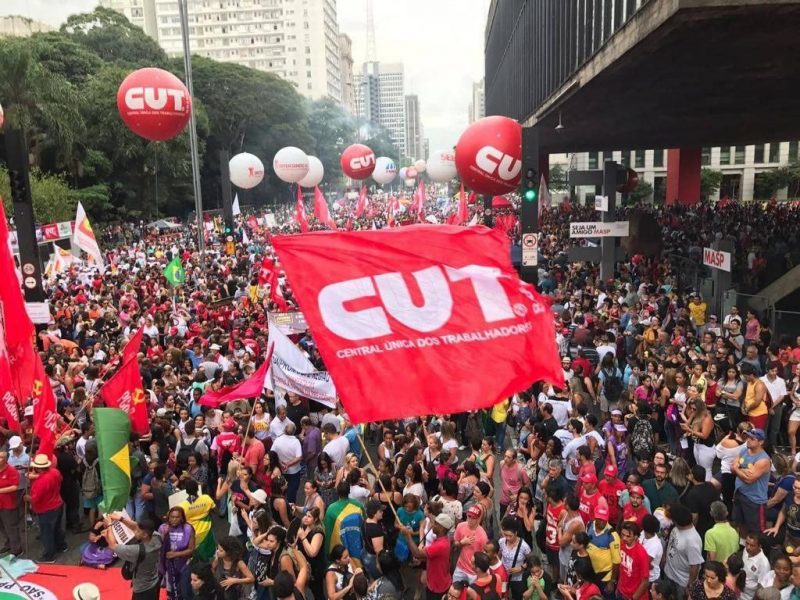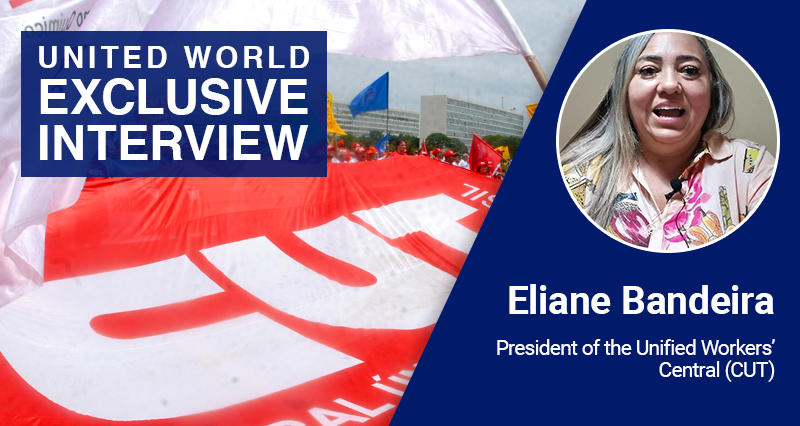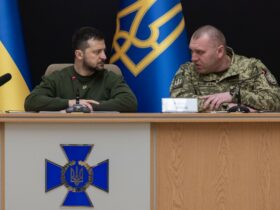Reporting from Natal, Rio Grande do Norte
The Unified Workers’ Central from Brazil (CUT) was founded in 1983, when the country was still going through the last military dictatorship (1964-1985). The (CUT), along with the Workers’ Party (PT) and the Landless Rural Workers’ Movement (MST), was one of the key organizations that challenged the Brazilian military’s strikes in automobile factories located in the ABC region of Sao Paulo. These three organizations, CUT, PT, and MST, are linked and united from the very beginning in the same struggle. Let’s also remember that Lula da Silva came from the ABC region, the automobile factories sector, and was also the founder of the Workers’ Party, he has closely participated in the creation of the CUT and the MST.
In June, United World International had the opportunity to speak exclusively with Eliane Bandeira, President of the Unified Workers’ Central and director of the Union of Public Education Workers of Rio Grande do Norte (SINTE-RN). Bandeira, who will also run for deputy in the next general elections in Brazil, talks about the CUT and the current political, economic and social situation in Brazil.
What is the CUT?
The CUT is a trade union center which – for example – has 210 affiliated unions only in the state of Rio Grande do Norte. The CUT is a center that brings together the largest number of unions in all of Brazil, and outside our country, the CUT represents the largest workers’ center in Latin America. Among the unions gathered in the CUT, there are those from the education, commerce, service, rural, urban, private, and public sectors. Union forces that share the same political ideology and that think of a different Brazil meet here, at the CUT.

In this sense, since 2016, when the parliamentary coup against President Dilma Rousseff took place, the CUT had the courage to take the challenge of assuming a political project that was in dispute. With the support of the fascist right, and also some part of the left that failed to understand what was at stake, that it was not just the position of President Dilma, it was not just the Workers’ Party (PT), but that it was about the need of defending a class project, this happened and this is how we suffered the coup.
But today we can proudly say and prove that we were on the right side of the history. Today people suffer from the current government that has carried out major attacks on the working class, has taken away our rights, and not only labour rights, and increased racism, attacks on women, minorities, caused hunger, misery… So, history has proven that, in 2016, when the Unified Workers’ Central determined which side to be on, we were on the right side: together with the workers, fighting for their rights.
What is happening today in Brazil?
Today Brazil is going through a great political, economic and social crisis. Of course, saying this is nothing new, because this has been happening since 2016, when our president Dilma was unjustly impeached, a process of dismantling democracy in this country has began. In this process, the reforms were carried out whose purpose were not to improve the lives of Brazilians, but rather to cut down on rights, to drag workers into job insecurity, and, in short, to attack constantly on the working class and the poor people of our country.
As a result, we have very high rates of unemployment and job insecurity today. The CUT organizes different demonstrations to support the workers. For example, last week, we held a protest against the fast-food chain McDonald’s, due to the working conditions of its employees. Today we see how it is possible to contract by the hour, day and week, subtracting the responsibilities of the employer, in such a way that all rights are denied by workers. This is something that has been deepening in this country, with the current government.
Another issue that we have been working on with the working class is the issue of the fallacy or deception of the “micro entrepreneur”, which is nothing but just people with precarious jobs, trying to obtain an income which is mostly insufficient and without the protection necessary for the worker and his family. Because the State and the government do not have a policy on these micro-entrepreneurs. This constitutes another form of precarity of services and withdrawal of labour rights. In the context of pandemic and loss of rights, the CUT has been attentive to raise awareness and discuss these issues.
From the social point of view, when there are high rates of unemployment, insecurity, denial and decline of rights, and abolition of the social security system, it is easy to see that all these elements combine to create major social problems. So, today in Brazil the majority of our population is in misery, in a process of exclusion. Today a major part of our population is in hunger, without housing, without medical assistance. That is, all those policies that have been implemented which have deepened inequalities and social inequities, after the 2016 coup by the fascist government in our country.
What does Lula represent for the Brazilian working class?
Today, Lula represents the hope for change for real and democratic transformation, not only in Brazil, but also in the world. During his two presidential terms, Lula led the people, we inverted the pyramid in terms of the country’s income, and I can say this clearly because I witnessed very closely the transformations we went through in Brazil during the years of Lula’s presidency. At that time, I was coordinating the Youth and Adult Literacy Movement (MOVA Brazil).
The Lula government had the courage to take a challenge to bring illiterate people out of the darkness, especially to promote the political participation of the people, to immerse them into the world of reflection and citizen participation in politics. During our trips in this country, we could see the arrival of light, water, health, education in the homes of Brazilian people. We were happy to see the poor people of our country being able to take their children to universities; we managed to see our people had a good life.
So, Lula represents all that, Lula represents struggle, life, hope, dignity, in short, a better life for the Brazilian people, full political, social and economic participation for our working class.
What is at stake in the upcoming presidential elections?
This 2022, is the year of our lives, because next October 2nd, we will have the opportunity to change the course of this country. The Brazilian people are going to choose what project they want for their country. That’s why, in this process, it is necessary to have the capability of dialogue, and to build what these two projects that are in confrontation mean. I always say that it is not Lula versus Bolsonaro, but two very different country projects: Lula represents one of them, which means inclusion, equality, and the participation of the people in the design and execution of this country project; the other represents the continuity of Bolsonaro, which is hunger, misery, exclusion, and the sell our country to foreign capitals, deepening of poverty, unemployment, the loss of rights of the most needy population, lack of education and health. Bolsonaro represents all this suffering for the Brazilian people.
For all these reasons, this year, we have the opportunity to stop this sorrow, and bring back the happiness to the Brazilian people, and I assure you that we, at the Unified Workers’ Central (CUT), will have this historic task as our highest priority. For this, we will dialogue with the working class, especially in the circles of the most needy population of our country. The CUT has already begun to do this, through the Popular Committees of Struggle, from there we are intensifying the dialogue process from the people’s bases. We are thinking beyond the presidential elections, the transformations that Brazil needs to carry out. In addition, this 2nd of October, we are not only going to elect the President of the Republic, we must also elect a group of senators and deputies, from the Legislative Power, who can provide sustenance and support to the next Lula government.
Therefore, the CUT must continue to be close to the working class to organize us and be able to defend ourselves from the attacks of the Bolsonaro’s side, because electing Lula will only be the first step for the re-democratization of Brazil, but the fight will continue. For this, 2022 is the year where our own lives and future are at stake.
What is the country project that Lula proposes to Brazil?
Rightists in Brazil have tried to impose the idea that Lula does not have a project for the country, but that is not true. Lula does have a project for the country, and that project is built by everyone through dialogue and collective construction. As the Patron of Brazilian Education, Paulo Freire, says, we “listen to the pains of our people” so, this construction does not exclude their needs and demands. The country project that Lula defends, that the CUT defends, is a project with social inclusion, with housing, health, education, equal opportunities for our people, without racism, without machismo, without femicides. It is a country where all Brazilians are included.
Because of that, saying that Lula does not have a project for the country is a big lie. The mass media have tried to put that idea in the minds of the Brazilian people, but the Brazilian people know what Lula’s project is, because they have already seen it in previous Lula governments, and they already understood what is at stake. We will ensure the re-election of Lula in the streets, in the people’s struggles, and we will continue to fight to realize this project, where capitalism is not the main flag, but the needs of the people.
What does the Brazilian Northeast represent in these upcoming elections?
We have a very large revolutionary force here, in Rio Grande do Norte. In the last elections of 2018, we managed to overthrow great bosses of the politics, and this victory is present in the DNA of the working class. It was the organized working class that managed to overthrow those oligarchs. In addition, we managed to elect Fátima Bezerra as the governor of the state, the only woman governor in the entire Brazil. She is a Northeastern woman who has been attacked by the federal government and, of course, has not received any support from them.
The Brazilian northeast knows that it has made an important difference, a great resistance against Bolsonarism. Here, Bolsonaro did not obtain a large number of votes, in the last elections, because the people of the Northeast have experienced the great advances in social and economic matters that this region of Brazil had, during the governments of the Workers’ Party (PT), and it is not possible to deny. The Brazilian northeast will once again be decisive in these elections, in this dispute over antagonistic political projects.
To achieve this, we are building some alliances that do not have everything we’d like, but that we need to join forces. This is how we have given the necessary importance in this difficult moment that our country is going through. We must guarantee Lula’s victory and along with it, in order to defeat the project of the right, which has attacked the Brazilian people, especially the poorest people, we must begin to confront the progress of fascism with more force.
What is your final message for Latin America and the world?
Finally, I would like to say that what is happening in Brazil today is not something that was thought of only for our country; this is a capitalist and imperialist strategy designed for Latin America and for the rest of the world. Therefore, now is the time to unite, for unity among all the peoples of the world. We have a saying like this: “let no one go anyone’s hand”, today, more than ever, we need the support and solidarity in all of Latin America, of all the peoples of other latitudes. All those peoples, who think, believe and dream for a better world with more equality, fraternity, solidarity, unite and resist in this moment. Because the progress of the right and the extreme right are not the peculiar problem of Brazil. Thus, we need to stick together more than ever to resist and advance in our struggles.

















Leave a Reply